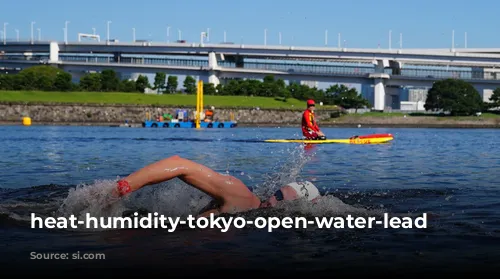The Tokyo Olympics are in full swing, but the intense heat is posing a serious threat to athletes’ well-being. Temperatures are soaring, making even simple tasks feel like a chore, let alone competing at the highest level. This article explores the dangers posed by the extreme heat and examines the decisions that led to these unsafe conditions.

A Toasty Welcome: The Heat’s Impact on Athletes
Florian Wellbrock, the winner of the men’s 10 km open water swim, described the “temperature” as the “biggest competitor.” His words echo the sentiments of other athletes who have endured the sweltering conditions. Haley Anderson, an American swimmer who finished sixth in the women’s 10 km, acknowledged the “pretty warm” conditions, while silver medalist Sharon van Rouwendaal remarked on the “tough conditions” that became increasingly challenging as the race progressed.
The official starting temperature for the women’s 10 km open water swim was 29.3 degrees Celsius (84.74 degrees Fahrenheit). Imagine swimming six miles in water that hot! It’s no wonder athletes are struggling, and the danger is undeniable.
The heat isn’t just a problem for aquatic events. Athletes competing on land are also facing grueling conditions. Temperatures have reached the upper 90s with high humidity, creating a “feels like” temperature of 106-108 degrees Fahrenheit. Tennis player Daniil Medvedev even expressed concern for his life during a match, saying “I can finish the match, but I can die.”
From the Heat to the Hospital: Health Concerns and Reschedulings
The extreme heat is leading to a growing number of health concerns among athletes. Tennis player Paula Badosa was forced to retire from her quarterfinal match due to heat stroke, while golfer Lexi Thompson’s caddie, Jack Fulghum, had to withdraw from their round due to heat exhaustion. Even a caddie was rushed to the hospital with heat stroke earlier in the week.
Some events have been rescheduled for cooler hours in an attempt to mitigate the risks. The women’s gold medal soccer match between Canada and Sweden, originally scheduled for 11 a.m., was moved to 9 p.m. due to the anticipated “sweltering” conditions.
A Question of Priorities: The Olympics in a Greenhouse
These grueling conditions raise serious questions about the decisions that led to the Tokyo Olympics being held in the dead of summer. It seems the International Olympic Committee (IOC) and Tokyo organizers have prioritized television rights and financial gain over athlete welfare.
The decision to hold the Olympics in August, despite the intense heat, is a clear indication of their priorities. NBC’s massive $7.75 billion rights deal for the Olympics from 2021-2032 has given them significant influence over scheduling, making weather considerations secondary.
While October would have been a more suitable time for the Olympics, the scheduling decision was heavily influenced by the need to avoid competing with major sporting events and popular TV shows in the United States.
The lack of concern for athlete safety is alarming. The organizers’ failure to foresee the dangers of extreme heat, despite historical precedents and warnings, is appalling. This isn’t a new phenomenon. Atlanta’s 1996 Olympics organizers were accused of misrepresenting the average summer temperatures to secure the bid. The potential risks of competing in extreme heat are well-documented, yet the IOC and Tokyo organizers seem to have turned a blind eye.
The Price of Greed: Putting Athletes at Risk
The tragic death of American swimmer Fran Crippen in 2010, during a race in scorching water, is a stark reminder of the deadly consequences of open water swimming in extreme conditions. The IOC and Tokyo organizers must be held accountable for their reckless disregard for athlete safety.
While the open water events at the Tokyo Olympics are technically within the safety guidelines, they are dangerously close to the threshold. American open water swimmer Haley Anderson, who trained in a heated diving well in preparation for the sweltering conditions, admitted that October would have been a more suitable time for the Olympics.
The organizers’ prioritizing of financial gain over athlete safety has put these competitors at risk. The Tokyo Olympics are a showcase of athletic achievement, but they should not come at the cost of human lives.
This event serves as a wake-up call to ensure that future Olympic Games prioritize athlete welfare and safety above all else. It’s time to stop treating athletes as mere commodities and start treating them with the respect and consideration they deserve.

